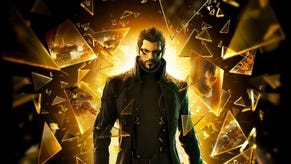The RPS Verdict: Deus Ex
It's been a while since we got together to do a verdict. That splendid Deus Ex anniversary seems like the right kind of time to do so. Below we judge the game, ten years on. Does it live up to the legend?
Jim: Are we ready to talk about Deus Ex being ten years old?
Alec: 10 years? it doesn't look a day over nine and a half
Jim: Kieron, you're probably the best person to sum things up. What is Deus Ex?
Kieron: I will never escape the duty of custodian of the Deus Ex flame. Deus Ex is Ion Stom Austin's 2000 PC Game. It's the thing which prevents Ion Storm being looked at nearly as badly as it was looking for a while. Where Daikatana was a famous disaster and Anachronox was a visionary if niche underperformer, Warren Spector's team made Deus Ex the state of the art of videogames. There's some who'd argue it's still, in its ambition and achievement, the state of the art today. As in, we haven't gone further. It's a first person RPG - what was later termed by Ion Storm as "The Immersive Sim". In the lineage of Ultima Underworld, it models a realistic physics-based universe and sets you forth to have an adventure. In this case, a 21st century cyberpunk/Conspiracy-theory thriller.

It's notable for two main reasons. Firstly, it's the aesthetic inverse of Thief in terms of the lineage. Thief concentrated to one aspect of the immersive sim - stealth - and made the whole game about it. Deus Ex included everything - from stealth to conversation to violence - hell, to multiple ways of violence. Secondly - which leads on from the first - it was the game which brought the concept of freedom of choice far more to the forefront that other first-person games. Levels were open places for expression of your skills. You made it up as you went along. Rather than a level saying what you should do - a puzzle to be solved - often Deus Ex presented a problem, gave you the tools and let you at it.
It also had terrible voice-acting. That's Deus Ex.
Alec: Don't forget the Greasels
Kieron: I was saving that for Jim. Custodian of the Greasels
Jim: Fucking greasels! But let us not dwell on them.
Kieron: Probably best to start with saying everyone's experience of DX.
Jim: Alec, you want to go first?
Alec: My experience of Deus Ex was buying based on - egads! - a PC Zone review, then leaving it on the bus on the way home. So I copied it from a friend, and played it over the course of the following 18 months. It was the first game where I combed every single corner, tried every permutation (via savegames), because I was so amazed at the possibilties, the depth. I thought you just played games to get to the end. Deus Ex changed that. But I never invested many points in swimming, which means there's still some manner of goodie at the bottom of the canal which I've never found. One day. One day.
Jim: My experience was a little strange, I think, because it was based on Kieron reviewing it.
Kieron: Man!

Jim: It was the game Kieron was reviewing when I started work at PC Gamer. But I couldn't play it myself, so I was simply getting all these hyperbolic reports about what had happened, why it was exciting, and so on. I think the 95% scored review was sent to press at the start of my second week on the mag. That, I thought, was what being on PC Gamer was going to be like.
Kieron: Oh, man, heartbreaking. My first game I reviewed was Thief: The Dark Project. It totally gives you a false impression.
Jim: And actually at the time, I just assumed that games were going to be like that in the future.
Alec: What was the first game they gave you to review, Jim?
Jim: An Army Men game. I can't remember the name. Anyway, the original System Shock at basically signposted the future, as far as I was concerned, DX seemed like just another waypoint on the road to our immersive sim horizons. I went on to get Deus Ex when it came out a few weeks on, and I played it through, even playing it at a Quake 3 LAN i went to, instead of the matches I should have been playing.
John: The first game I reviewed for PC Gamer was Minigolf. I gave it 3%. I had a very accurate impression of the following eleven years.
Jim: I am playing it again at the moment and, I think, enjoying more this time.
Alec: I admit I've only dipped in and out of DX since. Too many videos of the bad acting, too many write-ups claiming impossible things, too much hyperbole. I want to cling to my memories and experience, not have it tainted by age, creakiness and other people's bluster. Even looking in on it last night, I was horrified by how not-huge the levels seemed now. I didn't want to destroy their grandeur in my memory, so I couldn't stay for long.
Kieron: I suspect we're going to come back to the idea of Deus Ex as an ambassador of what we though would be the future.
John: I've only played DX through once. I've played the start of it a lot of times since. But part of me doesn't want to replace the memory I have of it. For me it doesn't really get stored in the "A game I played" category in my head. It has its own unique folder. I remember it like someone might remember a three month interailing trip. So playing it again would be like revisiting those places in the hope of recapturing those old memories.
Alec: "Remember when we stayed here? They had those nice biscuits."

Jim: There is a lot of random food in DX.
Kieron: I'm still annoyed at how fast Cigarettes kill you.
Alec: Deus Ex is a signpost to our anti-smoking game future.
John: Plus, how could I approach it without cynicism? For me, playing it through, it was an unfolding mystery. I was, and this is the most crucial thing, making decisions. I'd not be making decisions another time. I'd be making calculated choices.
Kieron: I dunno - Like Jim, I'm replaying it at the moment, and there's a sort of joy to playing with some of the options. I blew up Anna Navere last night. With the LAM-on-the-way-into-the-jet trick. Which is the sort of thing everyone talks about, but I finally got around to trying it myself. It's been so long that I'm fine with it.
John:This is my point. It would be about trying things out. Rather than a truly honest experience. Which is awesome - I've done the same with KotOR and so on. But I kind of don't want to do it to DX.
Kieron: DX is less about the emotional options though, rather than mechanic expression - which I suspect we'll get onto in a minute. Me though: I haven't actually completed it a second time either oddly - which means none of us have, which is interesting. As Jim said, I reviewed it - and may write a little about the whole story to do with that period then - and ended up getting involved with the SDK with a mod called The Cassandra Project. So even though I've never played it all through again, I've been deep into the guts of the beast. I suspect that also contributed to me not doing another complete playthrough. I've seen DX in a way which none of you guys have.

Kieron: Okay, why the hell does DX matter? I mean, really. There's 10 year anniversaries all the time. DX is the only game we've even considered doing. Not Planescape, not Longest Journey or Quake 3 or anything which is our touchstones. But we're doing DX. Why?
John: I considered doing TLJ. But then I forgot.
Alec: Deus Ex is generationally important to us, as PC gamers in our early 30s. And it turned up in an age where games were looking fairly pathetic and meatheaded, saying "no - this is not good enough." It hit at a time where we wanted more, where we wanted to validate both our hobby and our career choice.
Jim: I'll venture something. I suspect I'm the person who likes DX the least out of the four of us. I was very critical of it at the time. There's a lot I didn't like about how it worked. And I think that's because I didn't like how a lot of the different tools it provided worked, and lots of the mechanical bits annoyed me. Ladders, fucking Greasels. Even guns and skills. But, and this is the bit about importance, the issue was that it *had* all those tools. It was a big box of things, all done to different degrees of proficiency. Rather than a couple of things done well. Deus Ex is broad in a way I think we'd like lots of other games to be. And yet they aren't. Designers prefer to get a few things right.
Kieron: This is the reason why Deus Ex would only get a 9/10 in Edge. There's a whole school of thought based on games which would argue that is a failing. To the school of thought who'd argue against that, it's the Ocarina of Time.
Alec: Well, you could also argue it led to things like Pathologic, which are almost unplayable.
Kieron: Pathologic as a true son of DX is an interesting one to think about. Though I bristled a bit at Alec's suggestion. Before deciding he's right about it being a game which was *just* a bit more grown up. I don't think it was a complete oddity, but seeing a game which had clearly read a whole load of the same books I had was a startling joy. (I mean, was Silhouette informed by the Situationalists? I never had the heart to ask Warren or Harvey)
Alec: But what I really think is that its absolute multitude of possibilites led to a splintering of exploration from all its ideas, Pathologic being just one.
John: Yeah, that's the thing. I think its mechanics were splendid, but I don't think the combination of FPS and RPG was why it was special. It was special because it was smart, and it made me smarter for playing it. It was well read, it was eloquent, and it was proud of that.

Jim: The importance, though, was probably in its unique position, appearing at a crucial time for shooters, and a crucial time for RPGs. It took elements from them all and put them together in a way that didn't really have too many parallels. (totally disagreeing with John!)
John: Let's fight!
Jim: We can settle it with a game of DX multiplayer, later.
Kieron: I suspect this is showing your biases, if you know what I mean.
John: I've said this before, but it was playing DX that made me realise I didn't know anything about politics, and it started me off in the direction of learning.
Alec: I had read none of those books, nor indeed any cyberpunk. Which made it doubly amazing to me, and I had no qualms or questions about what it was telling me at the time - it was a whole new, bewilderingly incredible world. But yes, as with John it was effective in making me really question government for the first time.
Kieron: Deus Ex as Public Enemy. Never thought of it like that.
Alec: Don't believe the hype (about new labour) Like I say, this is the importance for me - the right game at an incredibly formative period of my life. The period where my brain started to grow. If I hadn't played Deus Ex, if I'd have an N64 instead... I shudder to think.
Jim: It's an incredibly rich storyworld, really. And not one set in a fantasy land, but in the real world, a bit further down the road. I think, actually, it is worth playing it again now for precisely that reason. I "get" more of it now than I did when I was 21.
Kieron: Yes - I'll agree with that. I was actually kind of bewildered how sledgehammer it was. In the same way - but opposite aesthetics - I got from playing Sacrifice, that I'm a better gamer now makes it a better game.
Jim: Interesting - perhaps that's it's real value? A game we can agree was edifying, rather than, eugh, "fun".
Alec: A game that taught us to think bigger, even as we clubbed greasels to death
Kieron: The reason why it's such this touchstone is because *this was the next logical step of how we of a generation saw games going*. As in, Deus Ex was natural. Jim McCauley reviewing it deliberately positioned it as "The best game in the world". And presented the idea that it was a lineage, like Best Boxer or whatever
Jim: Goddamn greasels.

Kieron: And anyone who believed in a certain way of games would agree with it. The reason why DX is remembered... is that in those terms, in that idea of what games "should" be like, it's never been superceded. As in, it was a gateway into the future. We all believed it would be, because that's what happens. And then it didn't.
John: It's the Half-Life 2 of, um, games that aren't Half-Life 2.
Kieron: And the future we were expecting and then the future didn't happen. It's our "Where's our rocketpacks?": Where's our Deus Ex 2!
Alec: It was very much The Game Of Its Time.
Jim: But it's down to design philosophy, I think. Games have been pushed to do fewer things, and to do them better.
Kieron: The crowbar was a nod to Half-Life, of course. It wasn't a game that was just at the apex of the Looking Glass tree - it was a game which also sublimated the id-derived culture.
Jim: Deus Ex feels like the last time doing a lot of things was really okay. Even big games RPGy like Fallout 3 lack the broad messiness.
John: Is that a financial thing? Did LG hit a sweet spot where it was affordable to be good at a lot of things? And now to focus that broadly would push you over the $100m mark?
Kieron: John's basically right. I'm talking to a load of devs for interviews at the moment and the question I'm asking them all is "The 00s trend was basically you trying to work out a way to make a game which used DX's ideas, but sell enough to justify it" DX's 500k isn't enough.
Jim: But isn't that down to marketing? That *also* suffers from deliberate simplification.
Alec: I was intervewing THQ's Danny Bilson for GI the other day, and his stance was that all their games have to be blockbuster or bust now. That's the philosophy. RIsks can be taken, but only within the shell of something palatable to COD players.
Jim: The assumption is that gamers don't want complexity.
Kieron: I don't think Jim's right. I just think there's complex and there's complex. I think it's just about the money. The problem with a DX game is that it needs AAA-aesthetics. (Not that DX was cutting edge at the time)
Alec: Y'know, I'm not sure it does.

Jim: The Witcher sells a million copies, a DX style game could easily do the same.
Kieron: It needs to be comparable to whatever a FPS game is doing
Alec: A cheap deus ex would have to avoid trying to be photoreal, but a Russian studio could totally do a king's bounty on something interesting
Kieron: Witcher outsold DX1 in the same time, it's worth noting. But yeah - if a development studio worked in that space, it could.
Jim: It's interesting to see a few people in the RPS comments saying "Stalker is the only thing that holds up DX heritage", which is basically "give a shooter a sandbox and an inventory"
Kieron: That's the other thing I find interesting: very few studios try it. Though Central/East Europeans do try it. I mean, Boiling Point.
John: Well, how smart do you have to be to get it right? Genuine question. Were Looking Glass / Ion Storm exceptionally clever? Does it take that level of intelligence to be able to pull this off?
Kieron: I think they're enormously hard games to design. I say this from experience. Or close enough.
Jim: Very smart, but I am not sure that's got anything to do with trying to make it. I think people make a) what they think people want to play, and b) what they themselves want to play. I don't think DX is what most dev teams would *want* to make. A few do, as we will see from the interviews this week, but they are in the minority.
Alec: yeah, it's about resources, being able to investigate, test and fix every permutation. That's why these risks aren't taken, devs have to cater for every possible place a player can be, and every possible situation they could be in. With budgets and graphical assets and team-sizes ever-rising... well, it becomes a terrifying task
Kieron: DX totally accepts that occasionally crazy shit will happen.
Jim: And that's why it works.

Kieron: Okay - let's step away from the myth to the actuality. How does it hold up now?
Jim: It remains ludicrously ugly, but that's somehow ok.
Alec: I quite like the ugly, but the darkness is comical, given how much we snigger at brown games now. I don't think any of it is in daytime, is it?
Jim: No blue skies.
Alec: The first level remains a marvel. A whole lot of talking and urgency, but you're almost immediately let off the hook to wander. Terrorist attack, but I'm busy breaking into a unatco basement for minor toys.
Jim: The painful thing, going back, is that is it really is so refreshing to play with tranquiliser darts and trip bombs and batons and sniper rifles. So much stuff! From the start!
Kieron: The first level is fascinating. At the time, it was viewed as a problem, as in, something which turned a lot of people off. Looked at today, and it's a fucking masterpiece.
Jim: There's so much there. Patching up different parts of your body. Having your legs shot off and not being able to reach the medkit on the table. So many variables.
Alec: Stealth right off the bat too, and it's sort of hard - for an opener, it throws so much of the game right at you immediately
Kieron: The stealth's terrible, bless it. And yeah, that's why it tripped everyone up - that it *does* throw so much at you.
Jim: Actually the first level annoyed me when I originally played it. I felt like the way I bodged through was clumsy and inelegant.
Alec: And the running noise. Is he in high heels?
Jim: heh
Kieron: Deus Sexy!
Jim: Future fashions for men.

Kieron: I'm really enjoying playing it, but fuck me, is it twitchy. Some of its boundaries are just so ill-defined. I'm playing much more deadly than I did back in the day because Stealth is so twitchy.
Alec: Oh, and I love the casualness of the robot. It starts you on a wooden dock, filled with FPS-trad crates and then - hey- giant robot, just wandering about. Not mentioned, not interacted with, just there. Here Is Your World.
Jim: I did much better this time. But originally it was the gas station level, I think, that really made it for me. Because it was short, and I replayed it. And it was totally different each time. And I really began to realise how the game could throw things down differently.
Kieron: That's a lovely level. What do you think about the skill-mechanics now? As in, how the reticule ties to your character's skill? A couple of mechanic things - it's interesting how that if you stand still, basically you end up with a nearly perfect aim. It's an incredibly badly done "skill" system. In terms of its stated aim. But playing now, once you accept it, it works.
Jim: Yeah, that was one of my original gripes, I think. The game felt messy. But when you see that taken away, you realise the value in it.
Kieron: The health is the other thing - I'm actually not sure the body stuff really matters that much. In DX, generally speaking, you're either dead or alive.
Alec: It does want to stop you from just running around shooting wildly. Even though choice obviously remains within that, it's pretty up-front about not letting you be Doomguy. You *have* to be an agent.
Kieron: But you can be doomguy if you're standing still! It's quite mental in that way.
Alec: Doomguy = strafin.g
Kieron: Well, half-life guy (i.e. String of perfect head-shots)
Alec: Yeah. But then, Denton is an agent.
John:Can we talk about the twist?

Kieron: Er... I suspect we're boring john here. You got anything you think we should be talking about?
Jim: Yes, the story, does that hold up too?
Kieron: Well, the twist isn't. You watch the intro and you know who's the bad guys. You know all the conspiracies are true.
John: I have a story about that.
Kieron: HIT US
John: Back then, I was doing youth work. And this older kid, around 17, had also played it and he was very right wing in certain respects. And he was really cross about it. He believed that the government were distributing the vaccine correctly. And he felt like he had been forced into this change of sides, and was trying to help the government from the other side. But the game doesn't really endorse this nearly as well. Do you think it's a very biased narrative?
Kieron: Yes.
Jim: Goddamn Liberal agenda!
John: It's an interesting way in which the game really doesn't support choice.
Kieron: It's a conspiracy about a government falling into a fake-disease with a fake-vaccine
Alec: I like that nice Bob Page. He has a lovely smile.
Kieron: I talked to Warren Spector about this once, as in, about the game having a pro-pacifist bias. Because while characters respond to you if you kill or not. The characters who are likeable like you if you're good. Or less violent. And the moral monsters like you if you use force. In other words "You are like us"
Alec: yes, you can't be mates with Page or Simmons
Kieron: It's a game which is very happy to give you choice... and then judge you on it
Alec: Although you can horrify Simmons, interestingly, if you murder the prisoners near the start.
Kieron: i.e. If Anna Navere likes me, something's probably wrong. I don't think its bias is a problem. I mean, 1984 isn't any weaker because it doesn't argue for the system. It's a game with something to say.
Alec: "If only you could talk to the monsters."
Kieron: And it's a fine example of how player-choice doesn't actually mean the game can't be about a developer's expression too. Actually - can I say Ste's riposte to that? The "If only you could talk to the monsters"?
Alec: I suspect you're going to anyway.
Kieron: He noted that... well, Deus Ex is Doom... if you could talk to the monsters. And it *is* something. Deus Ex is the game which proved that Edge 7/10 review right, basically.
Alec: "If only you could teach the monsters the errors of their ways"
John: Is DX3 going to scrape the legacy?
Alec: DX3 may pick up where DX left off, but we're still missing 10 years of progress.
Jim: We're missing ten years of something, but perhaps it something that needed time. After all, we're seeing the legacy of UO and Eve in MMOs again now (Mortal, Darkfall, Perpetuum, Earthrise). Perhaps the legacy of DX is simply taking time to make itself known.
Kieron: I do kinda half wonder whether when the kids who were 18 in 2000 get to positions of power - which should be in the next 10 years - we'll be seeing stuff. Look at me be optimistic.
John: Go Kieron!
Alec: Isn't that people like Clint Hocking?
Jim: We'll come to that, later in the week!
Kieron: What a shame.













